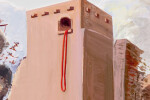Rahab

There are things about Mrs. Mitchell’s Sunday School class of my youth that are quite dull in my memory bank. However, some things are remembered well, like her seasonally themed cupcakes, her warm embraces, and her dramatic story-telling. One Sunday’s presentation seemed especially moving to this second grader. A large cardboard box had been transformed into the impenetrable halls of ancient Jericho. A red rope dangled from the window of a house that was part of the city’s wall. The house, I learned, belonged to the family of Rahab, a prostitute who lived on the outskirts of the city and on the margins of her society. With convincing enthusiasm, Mrs. Mitchell told us of how Rahab had committed a treasonous act that could get her killed. She had aided in the escape of Israelite spies.
Rahab had heard stories of how the Israelites were led by a powerful deity. Now, these people and their God were just around the corner, and invasion of Jericho was imminent. So, when the two Israelite men appeared at her house, Rahab made a far-fetching decision. For one who had no voice in her community, she boldly proclaimed belief in the God who sent them:
“...I know that the Lord has given you the land, and that the fear of you has fallen upon us, and that all the inhabitants of the land melt away before you. For we have heard how the Lord dried up the water of the Red Sea before you when you came out of Egypt, and what you did to the two kings of the Amorites who were beyond the Jordan, to Sihon and Og, whom you devoted to destruction. And as soon as we heard it, our hearts melted, and there was no spirit left in any man because of you, for the Lord your God, he is God in the heavens above and on the earth beneath” (Joshua 2.9-11).
Millennia later, Rahab is still remembered: how she hid the Israelite spies and sent the king's messengers in the wrong direction, how she lowered a rope out her window and helped the men escape, how she was spared when the Israelites returned because she had followed their instructions. Rahab is mentioned three times in the New Testament, for her faith, for her righteousness, and for her heritage. A woman, undoubtedly, shamed among her own people, she was graciously rescued and changed by the God of the marginalized.
Redemption in the Bible speaks of life-altering changes. By the power of the Spirit, we can be made into something new wherever we are. "Incline your ear, and come to me; hear, that your soul may live; and I will make with you an everlasting covenant, my steadfast, sure love for David" (Isaiah 55.3). Fourteen hundred years after Rahab helped the Israelites, the Jewish Messiah was born from her very lineage. God used this life, of seemingly little distinction, in the bloodline of his own Son. Only Christianity radically calls the forgotten to be a large measure of the hope it offers.
A biblical worldview is one that routes lives in a new direction. Being aligned with the God of Israel, Rahab was led to a place of safety during the battle of Jericho. "Our life for yours," the spies had assured her, and they left her with instructions for the coming invasion: “Tie this scarlet cord in the window and gather into your house all your father’s household...all there will suffer no harm. Rahab agreed. As they slipped down the rope, she tied the scarlet cord in the window. And, as promised, her life was both saved and renewed.
Such is the certain outcome of a life claimed by the living God. We are given hope and a future and placed in a sure direction. The Father takes the shamed and forgotten and remembers them.
Pastor Mullinax


Comments
Login/Register to leave a comment